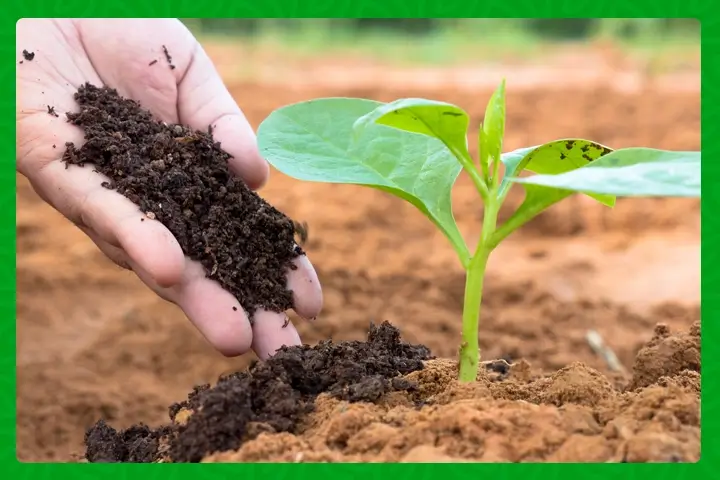
Organil Services, specializing in organic regulatory certification and with a keen interest in farming and agriculture, delving into the distinctive analogy pacing between Vermicompost and Farm compost offers valuable insights into sustainable soil enrichment practices with also paving diluting acumen on what is fertilizers and compost.

Vermicompost:
Vermicompost, often referred to as “black gold,” is a nutrient-rich organic fertilizer produced through the process of vermicomposting. This method involves the use of specific earthworm species, red wigglers (Eisenia fetida) or red earthworms (Lumbricus rubellus), as they are voracious eaters and breed quickly to break down organic matter into a potent and well-balanced soil conditioner.
1. Production Process:
– Vermicomposting relies on the digestive activities of earthworms to decompose organic waste materials.
– Worms consume organic matter, partially digest it, and excrete nutrient-rich castings.
2. Nutrient Content:
– Vermicompost is characterized by a higher concentration of essential nutrients such as nitrogen, phosphorus, potassium, and beneficial microorganisms.
– It often contains elevated levels of plant growth hormones, aiding in seed germination and overall plant health.
3. Microbial Activity:
– The involvement of earthworms enhances microbial activity in vermicompost, promoting the development of beneficial bacteria and fungi.
Farm Compost:
Farm compost, on the other hand, is a more generalized term for compost produced through traditional composting methods, excluding the use of earthworms. Farm compost is a type of organic fertilizer that is produced by using microorganisms to break down organic matter, such as crop residues, animal manures, and food scraps, in a controlled and aerobic process.
1. Production Process:
– Farm composting involves the decomposition of organic matter through microbial activity, heat, and aeration.
– Pile turning and proper layering facilitate the breakdown of organic materials into a nutrient-rich soil amendment.
2. Nutrient Content:
– While nutrient content varies based on the input materials, farm compost tends to have a more balanced nutrient profile compared to vermicompost.
– It may contain a broader spectrum of organic matter, including plant residues, kitchen waste, and farm by-products.
3. Microbial Activity:
– Farm compost relies on the activity of bacteria, fungi, and other microorganisms for decomposition, contributing to a healthy soil microbiome.
Recommendations for Organic Practices:
1. Integration of Both:
– For optimal soil health, consider integrating both vermicompost and farm compost. This approach leverages the strengths of each method to create a synergistic impact on soil fertility.
2. Certification Considerations:
– As an organic regulatory certification consultant, emphasize the importance of using organic inputs in both vermicompost and farm compost production to meet certification standards.
Vermicompost and farm compost are both types of organic fertilizers that are produced from the decomposition of organic matter. However, they have some differences in their composition, production, and effects.
****Here are some of the main differences:
– Vermicompost is produced by using earthworms to break down organic matter, while farm compost is produced by using microorganisms to break down organic matter.
– Vermicompost has more nutrients, such as nitrogen, phosphorus, potassium, and micronutrients, than farm compost, which makes it more effective for plant growth and soil improvement.
– Vermicompost requires less space, time, and labor than farm compost, as it can be done in small containers, indoors or outdoors, and produces compost faster.
– Vermicompost has a finer structure and a higher water-holding capacity than farm compost, which makes it more suitable for potting mixes and seed germination.
– Vermicompost contains plant growth regulators, such as hormones and enzymes, that are not present in farm compost, which can enhance the resistance and productivity of plants.

Fertilizers and compost are both substances that are applied to soil or plants to supply them with essential nutrients for growth and productivity. However, they have some differences in their composition, production, and effects. Here are some of the main differences:
– Fertilizers are substances that directly feed the plants, while compost is a substance that feeds and conditions the soil.
– Fertilizers can be natural, such as manure or compost, or synthetic, such as chemical mixtures, while compost is always natural, as it is made from decomposed organic matter, such as crop residues, animal manures, and food scraps.
– Fertilizers have a guaranteed scientific analysis of their nutrient content, such as the NPK ratio, while compost does not have a fixed nutrient content, as it depends on the source and quality of the organic matter.
– Fertilizers can provide a quick and precise boost of nutrients to the plants, while compost can provide a slow and steady release of nutrients to the soil and the plants.
– Fertilizers can cause problems such as nutrient leaching, soil salinity, and environmental pollution, if used excessively or improperly, while compost can improve soil quality, fertility, and productivity, by adding organic matter, beneficial microbes, and plant growth regulators.
Understanding the nuances between Vermicompost / Farm compost & Fertilizers / Compost empowers farmers and agricultural enthusiasts to make informed choices for sustainable soil management. As a leader in organic regulatory certification, your advocacy pledge for responsible composting practices aligns with the principles & centred nature harmonical policy of Organil Services, contributing to the promotion of eco-friendly and nutrient-rich soil amendments in the realm of organic agriculture.
Anil M V, Founder, Organil Services

Organil Services are Registered for Organic Regulatory Certification Consultancy and Accreditation Services in the Industry. WhatsApp for a Prepaid Consultancy +91 8606551335 or Email : orgnil40@gmail.com.
Source: LinkedIn Article


















